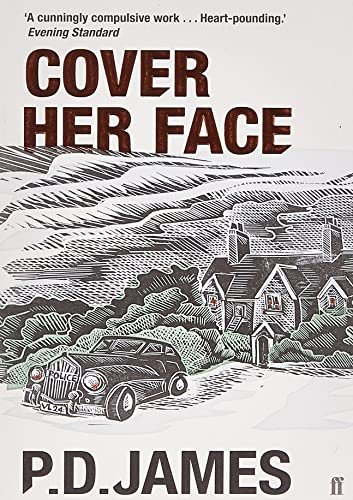Cover Her Face - PD James
What, for me, makes a good murder mystery?
It’s not always about working out whodunnit. After all, the author holds all the cards, and is doing their best to lead me down blind alleys. Besides, when reading I don’t stop to make to flow charts and time lines, so as the author drops hints and tit-bits in piecemeal fashion, I easily lose track of dates and times and who was where and when.
Besides, everyone is lying. Always. Especially the butler.
What I like is a mystery set far in a past where Google can’t give instant answers, mobile phones don’t exist, and the personality of the characters as well as the setting are as important and as interesting as the crime itself.
Lastly, the plot has to be accurate. Drugs do what they’re meant to do, not what popular fiction supposes. Poisonous flowers are in season. No dues ex machina is needed to save a bogged plot-line.
For me, P.D James’ Adam Dalgliesh series embrace all these factors. Set in England over nearly fifty years from 1962, they reflect the microcosms of various cultures of England at the time – such as life in London and the English countryside, in the university town of Cambridge, within the police force and other institutions, as well as the perceived role of women in society.
Above all, Dalgliesh himself remains an interesting character. Both an intellectual and an aesthete, he is a reserved man who writes poetry, is respected by his colleagues but understood by few, if any, of them. He is the quintessential ‘gentleman detective’ of English literature, a character who can only be born, raised – and educated – in England.
An idyllic cottage in the countryside © A. Harrison
Aside from the development of Dalgleish’s complex character, through the series other characters also grow, linking the books together in a narrative arc. James does not write of the same person doing the same things in each mystery, but of people who change with time, affected by what they do and see and feel, just as the world around them changes.
The series debuts with Cover Her Face. Sally Jupp, a single mother who works as a maid at the medieval manor house of Martingale, is found strangled in her bed. Naturally everyone wants her dead. Spoiler: there is no butler.
More interesting than the murder is the setting: a small English town in the 1960s.
‘…the party was both ordinary and rather dull. Three of the guests … had dined together too often to expect either novelty or stimulation from each other’s company.”
It is a world of horse rides in the morning and a village fête in the grounds of Martingale. A time when the local shop-keeper knows everything which is happens in the village but rarely talks while everyone else gossips around him. The English village becomes a microcosm of the world, and is itself a major character in the novel. In such a place unwed mothers are harshly judged, as are single women still searching for husbands. Sally has been sent to Martingale from a local home for unwed mothers, where those who fail marry the father of their child are trained for work as servants, so as to be accepted back into society, despite their failings and perceived liabilities.
“Despite this inauspicious beginning Sally Jupp’s first weeks at Martingale were a success. Whether she herself shared this view is not known. No one asked her for her opinion.”
The life of Martingale Manor revolves around the son and heir, Stephen, a doctor at the local hospital. As his father lies slowly dying upstairs, he sees himself as drowning under the future financial burden of supporting a struggling estate. Yet it is his mother and sister who do without, who make economies and run the household so Stephan can make a success of his career. Oblivious to the unbalanced burden carried by the women in his family, Stephen escapes into his work, and into an entanglement with Sally as he ignores the mess of an un-ended affair with a family friend. The would-be engagement with Sally is deemed by all as not social acceptable. It is an entanglement the family wants stopped, and one in which even those outside the household lay the blame firmly at Sally’s feet.
Dalgliesh enters this world with an intellectual spotlight, stirring with few words the undercurrents of the household and the village
“Catherine Bowers thought, ‘Tall, dark and handsome. Not what I expected. Quite an interesting face really.’
Stephen Maxie thought ‘Supercilious -looking devil. He’s taken his time coming.”
In his quiet, intellectual way Dalgliesh discovers the truth, as those around him slowly implode on seeing their world through another’s eyes. Few like what they see. Only Mrs Maxie, nursing her dying husband, seems untouched by the chaos of the household.
Throughout is all is the touch of James’ writing.
“Monday dawned without any colour or individuality, a mere limbo of a day.”
She paints both place and atmosphere with her words, and her characters become real under her touch. Such is to be expected from the author of novels such as Children of Men and Death Comes to Pemberly. In Cover Her Face James has created with a world which does not end with the denouncement and arrest of the murderer, but which continues on with all its failings.
A great read, as are the other books in the series. I binged them over the course of a few weeks, and enjoyed them all – and shall read them again.
Enjoy my writing? Please subscribe here to follow my blog.
Like my photos? - if you feel like contributing to my coffers, please click either here or on the link in my header to buy (or simply browse) my photos. Or else, please click here to buy either my poetry or novel ebooks. I even have a YouTube channel. Thank you!
Plus, this post may contain affiliate links, from which I (potentially) earn a small commission.




Fantômas is a French classic crime novel, written just before the First World War. It is one of the first crime novels to explore the psychology of the killer, and influenced both Arthur Conan Doyle and Agatha Christie.